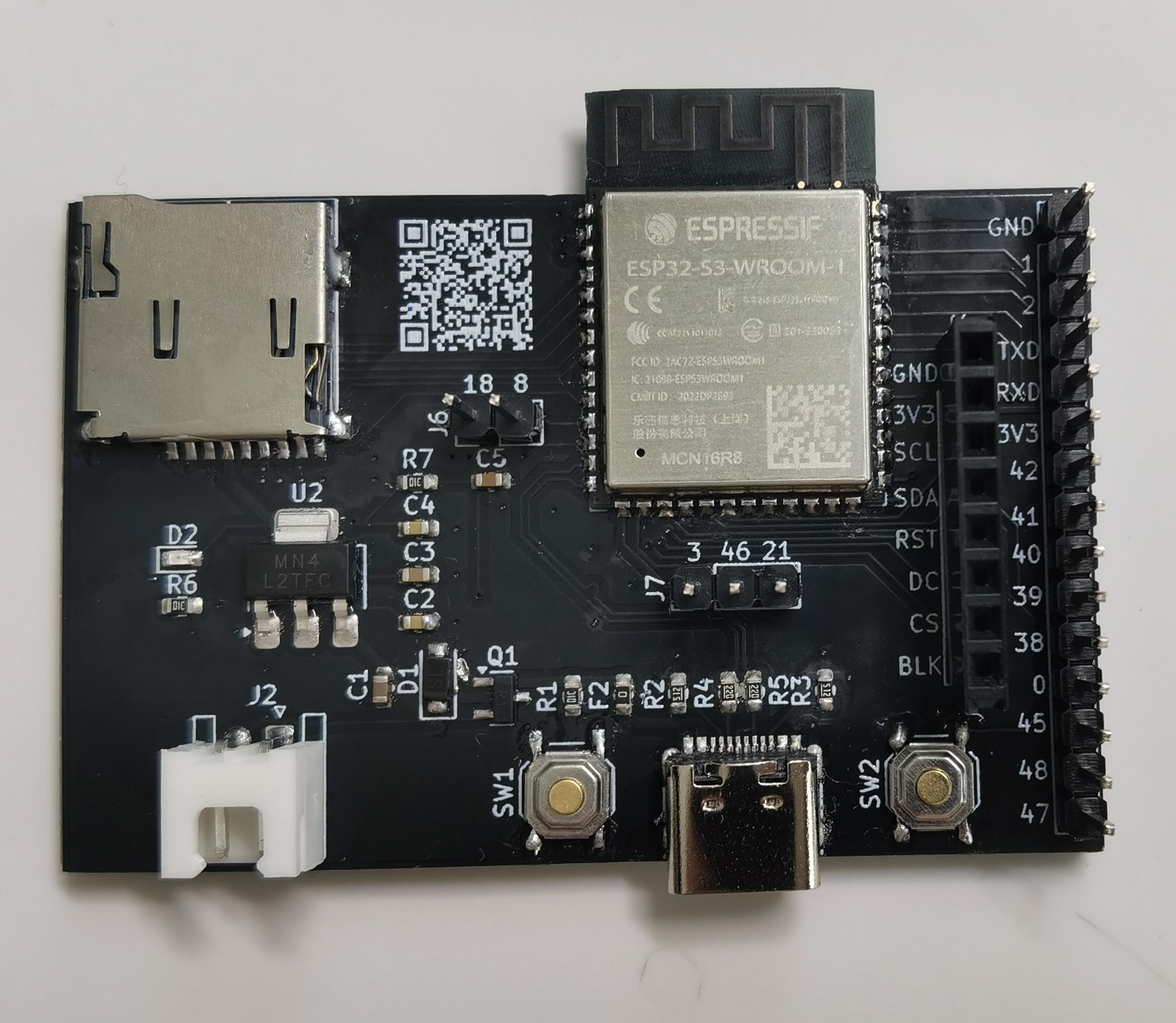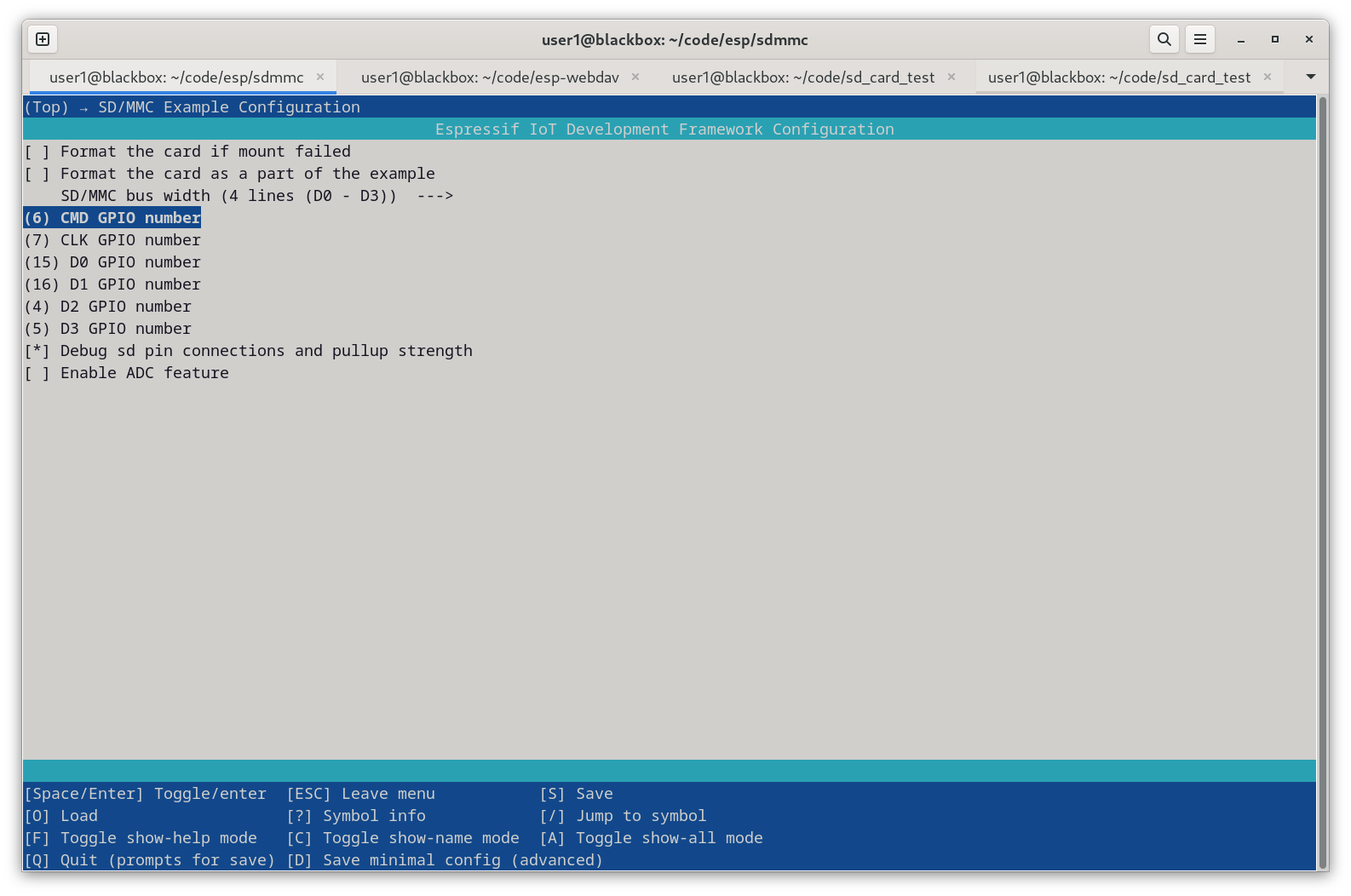一种基于ESP32丰富连接能力的移动存储设备 – 测试SD卡读写
前言
上一篇文章介绍了我为移动存储设备设计的一块电路板,并且PCB实物也收到了。现在我已经焊接好了电路板,接下来我想先测试SD卡的读写能力是否正常。 
本系列其他文章
测试SD卡功能
使用官方例子
要快速测试SD卡的功能,我先找了ESP-IDF 5.3中的一个C语言例子,例子在ESP-IDF源码中的这个位置 examples/storage/sd_card/sdmmc 。例子中的SD卡槽连接的管脚和我的PCB不一样,需要通过 idf.py menuconfig 修改CLK,CMD等管脚对应的GPIO口编号。修改之后的状态如下。 
然后使用 idf.py build 命令编译代码,使用 idf.py flash 上传固件。插入SD卡,测试很顺利。
I (897) example: Reading file /sdcard/foo.txt
I (897) example: Read from file: 'Hello SL16G!'
I (897) example: Opening file /sdcard/nihao.txt
I (1117) example: File written
I (1117) example: Reading file /sdcard/nihao.txt
I (1117) example: Read from file: 'Nihao SL16G!'
I (1117) example: Card unmounted
I (1127) main_task: Returned from app_main()
开发Rust代码
通过官方例子验证了我的SD卡硬件设计没有问题,下面就让我们通过Rust来访问SD卡。虽然通过搜索网路我找到一个Rust模块embeded-sdmmc,但是这个项目目前只支持通过SPI协议连接的SD卡。因为我为了获取更好的读写速度,选用了SDMMC接口,所以我无法使用这个模块。之后搜索也没有找到其他支持SDMMC的模块。所以只能直接调用ESP-IDF的C接口这个办法了。
通过查看官方例子的代码,我们了解到关键的接口是 esp_vfs_fat_sdmmc_mount 函数。
/**
* @brief Convenience function to get FAT filesystem on SD card registered in VFS
*
* This is an all-in-one function which does the following:
* - initializes SDMMC driver or SPI driver with configuration in host_config
* - initializes SD card with configuration in slot_config
* - mounts FAT partition on SD card using FATFS library, with configuration in mount_config
* - registers FATFS library with VFS, with prefix given by base_prefix variable
*
* This function is intended to make example code more compact.
* For real world applications, developers should implement the logic of
* probing SD card, locating and mounting partition, and registering FATFS in VFS,
* with proper error checking and handling of exceptional conditions.
*
* @note Use this API to mount a card through SDSPI is deprecated. Please call
* `esp_vfs_fat_sdspi_mount()` instead for that case.
*
* @param base_path path where partition should be registered (e.g. "/sdcard")
* @param host_config Pointer to structure describing SDMMC host. When using
* SDMMC peripheral, this structure can be initialized using
* SDMMC_HOST_DEFAULT() macro. When using SPI peripheral,
* this structure can be initialized using SDSPI_HOST_DEFAULT()
* macro.
* @param slot_config Pointer to structure with slot configuration.
* For SDMMC peripheral, pass a pointer to sdmmc_slot_config_t
* structure initialized using SDMMC_SLOT_CONFIG_DEFAULT.
* @param mount_config pointer to structure with extra parameters for mounting FATFS
* @param[out] out_card if not NULL, pointer to the card information structure will be returned via this argument
* @return
* - ESP_OK on success
* - ESP_ERR_INVALID_STATE if esp_vfs_fat_sdmmc_mount was already called
* - ESP_ERR_NO_MEM if memory can not be allocated
* - ESP_FAIL if partition can not be mounted
* - other error codes from SDMMC or SPI drivers, SDMMC protocol, or FATFS drivers
*/
esp_err_t esp_vfs_fat_sdmmc_mount(const char* base_path,
const sdmmc_host_t* host_config,
const void* slot_config,
const esp_vfs_fat_mount_config_t* mount_config,
sdmmc_card_t** out_card);
这个函数接收一个文件系统路径、SD驱动配置、管脚配置、挂载配置,输出SD卡对象的句柄。我们只要准备这些配置对象,就可以读写SD卡了。由于在官方的C例程中,使用了一些宏来初始化 sdmmc_host_t 和 sdmmc_slot_config_t ,这些宏在Rust中访问不到,所以我们需要参照C的源代码来初始化这些结构体。
通过Rust初始化 sdmmc_slot_config_t 结构体,管脚的赋值需要依据电路设计。
fn get_slot_config() -> sdmmc_slot_config_t {
sdmmc_slot_config_t {
clk: 7,
cmd: 6,
d0: 15,
d1: 16,
d2: 4,
d3: 5,
d4: -1,
d5: -1,
d6: -1,
d7: -1,
__bindgen_anon_1: sdmmc_slot_config_t__bindgen_ty_1 {
cd: 17,
},
__bindgen_anon_2: sdmmc_slot_config_t__bindgen_ty_2 {
wp: -1,
},
width: 4,
flags: SDMMC_SLOT_FLAG_INTERNAL_PULLUP,
}
}
构造参数mount_config、mount_point、host_config。
let sdmmc_mount_config = esp_vfs_fat_sdmmc_mount_config_t {
format_if_mount_failed: false,
max_files: 4,
allocation_unit_size: 16 * 1024,
disk_status_check_enable: false,
use_one_fat: false,
};
let mount_point = CString::new("/sdcard").unwrap();
let sd_host = sdmmc_host_t {
flags: SDMMC_HOST_FLAG_1BIT | SDMMC_HOST_FLAG_4BIT | SDMMC_HOST_FLAG_8BIT | SDMMC_HOST_FLAG_DDR,
slot: SDMMC_HOST_SLOT_1,
max_freq_khz: SDMMC_FREQ_DEFAULT,
io_voltage: 3.3,
init: Some(sdmmc_host_init),
set_bus_width: Some(sdmmc_host_set_bus_width),
get_bus_width: Some(sdmmc_host_get_slot_width),
set_bus_ddr_mode: Some(sdmmc_host_set_bus_ddr_mode),
set_card_clk: Some(sdmmc_host_set_card_clk),
set_cclk_always_on: Some(sdmmc_host_set_cclk_always_on),
do_transaction: Some(sdmmc_host_do_transaction),
__bindgen_anon_1: sdmmc_host_t__bindgen_ty_1 {
deinit: Some(sdmmc_host_deinit)
},
io_int_enable: Some(sdmmc_host_io_int_enable),
io_int_wait: Some(sdmmc_host_io_int_wait),
command_timeout_ms: 0,
get_real_freq: Some(sdmmc_host_get_real_freq),
input_delay_phase: SDMMC_DELAY_PHASE_0,
set_input_delay: Some(sdmmc_host_set_input_delay),
dma_aligned_buffer: std::ptr::null_mut(),
pwr_ctrl_handle: std::ptr::null_mut(),
get_dma_info: Some(sdmmc_host_get_dma_info),
};
let slot_config = get_slot_config();
参数都准备好了,最后调用esp_vfs_fat_sdmmc_mount挂载文件系统。
let mut card_handle: *mut sdmmc_card_t = std::ptr::null_mut();
let ret = unsafe {
esp_vfs_fat_sdmmc_mount(
mount_point.as_ptr(),
&sd_host,
&slot_config as *const sdmmc_slot_config_t as *const c_void,
&sdmmc_mount_config,
&mut card_handle,
)
};
match ret {
ESP_OK => log::info!("SD Card mounted"),
_ => {
log::error!("Failed to mount SD Card");
return;
}
}
再测试SD卡的基本文件读写功能。
let file_res = std::fs::File::create_new("/sdcard/test.txt");
let mut file = match file_res {
Ok(mut file) => {
file.write_all(b"Hello, world!").unwrap();
std::fs::File::open("/sdcard/test.txt").unwrap()
}
Err(_) => {
std::fs::File::open("/sdcard/test.txt").unwrap()
}
};
let mut content = String::new();
file.read_to_string(&mut content).unwrap();
log::info!("File content: {}", content);
日志如下,初步看来SD卡功能正常。
I (417) main_task: Started on CPU0
I (427) main_task: Calling app_main()
I (427) sd_card_test: Hello, world!
I (427) gpio: GPIO[7]| InputEn: 0| OutputEn: 0| OpenDrain: 0| Pullup: 1| Pulldown: 0| Intr:0
I (437) gpio: GPIO[6]| InputEn: 0| OutputEn: 0| OpenDrain: 0| Pullup: 1| Pulldown: 0| Intr:0
I (447) gpio: GPIO[15]| InputEn: 0| OutputEn: 0| OpenDrain: 0| Pullup: 1| Pulldown: 0| Intr:0
I (457) gpio: GPIO[16]| InputEn: 0| OutputEn: 0| OpenDrain: 0| Pullup: 1| Pulldown: 0| Intr:0
I (467) gpio: GPIO[4]| InputEn: 0| OutputEn: 0| OpenDrain: 0| Pullup: 1| Pulldown: 0| Intr:0
I (477) gpio: GPIO[5]| InputEn: 0| OutputEn: 1| OpenDrain: 0| Pullup: 0| Pulldown: 0| Intr:0
I (517) gpio: GPIO[5]| InputEn: 0| OutputEn: 0| OpenDrain: 0| Pullup: 1| Pulldown: 0| Intr:0
I (527) sd_card_test: SD Card mounted
I (527) sd_card_test: File content: Hello, world!
I (527) main_task: Returned from app_main()
以上就是Rust中使用SD卡的关键要点,其实还是比较简单的。
后记
有兴趣的朋友可以在sd_card_rust项目中找到完整代码,欢迎大家留言交流。
链接列表
- sd_card_rust – https://github.com/paul356/sd_card_rust